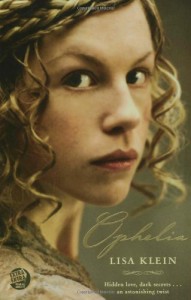Thalia @ Pictures in the Words
I'm Thalia! I run a book blog called Pictures in the Words and I hope to be an editor for YA fiction. I'm a GoodReads refugee!
Currently Reading




Ophelia (Review)

This is a book I’ve been looking forward to reading for quite some time. I bought it long ago and it has sat on my shelf these long years, waiting to be picked up. Eventually, I grew scared of it because I had such hopes for it, but it turns out that I shouldn’t have been at all afraid! Ophelia ended up being a mesmerizing and enjoyable tale, different from other Hamlet retellings I’ve read in the past, placing a unique interpretation on Ophelia’s character and her relationship with Hamlet. My one, ugly complaint about this book is that it had such an amazing pace that turned to a slow, painstaking crawl towards the end of the book, and where I had hoped for a climax, I instead crawled towards the ending after reading pages upon pages of nearly worthless fluff. However, despite that, I still honestly enjoyed the first three-fourths of this book, and I would definitely recommend it.
What I Liked: Spoilers!
- This novel tied into Hamlet really well. It didn’t follow the play exactly, but rather followed what Ophelia herself would have been present for. It had a lot of backstory that was relevant to her character and the story, which I appreciated. We got a sense of who Ophelia is, and the text from Hamlet is interpreted in such a way that Klein’s Ophelia is entirely possible in the context of the play. We have few stage directions in Hamlet, and there are so many different ways to interpret Ophelia’s words, especially when you consider what may be going on inside her mind. When I read retellings, especially if I’m familiar with the original work, I’m a huge stickler for accuracy. I much prefer it when authors make their piece fit within the framework of the story they’re working with. Klein did that almost flawlessly, and it turned into a great story. While I feel weird about this being my only bullet point for what I liked in a four star review, everything I loved about this book can be tied back to this very point. It was just very well executed on all fronts, and I appreciate this retelling for being just that—a retelling, with more substance than the source originally provided.
- Oh yes! A Hamlet retelling where Horatio and Ophelia finally get together. I am totally okay with this.
What I Didn’t Like:
- One thing in particular bothered me, and it’s something that bothers me in a lot of Hamlet interpretations. This book did not include the “To Be or Not To Be” speech that Hamlet makes. Almost every time I see a Hamlet imagining, in a film or in a book, it always seems to be forgotten that Ophelia was in the room with Hamlet, hiding, when he gave this soliloquy. One of my favorite parts of Hamlet is that Ophelia hears Hamlet’s most unguarded speech, and it always gets left out. It was left out here as well, and that was extremely disappointing to me. It would have added more depth to Ophelia’s feelings and confusion regarding Hamlet if she had overheard it here.
- The thing that irritated me most about this book was the pace at the end of the story. Ophelia escapes from Elsinore by faking her death and runs a convent, hoping to be taken care of by the nuns there. She is pregnant at the time and tries to hide it, but though she spends some time with the nuns and whatnot, way too much time was spent on her time at the convent. It added nothing to the story after Ophelia learned of Hamlet’s death, except to give her time to bide until she gave birth. I understand how the nuns were important to Ophelia’s story, but honestly? I was really bored after the play ended and we were just sitting around waiting…for what? It could have easily fast-forwarded a little bit to when Ophelia has her baby and Horatio comes back for her. It was painstakingly slow for this time, and it ruined the wonderful pace and story that had preceded it.
Overall: I did thoroughly enjoy this novel, pacing issues aside. I think it was a great retelling of a classic that added a refreshing and empowering twist on a character long downtrodden by readers. I think it portrayed Ophelia and the other characters wonderfully, and I would definitely recommend it. Perhaps ages thirteen and older—it’s very vague, but Hamlet and Ophelia have their heated moments together, so I’m erring on the side of caution. All in all, a really great read!
http://thaliasbooks.tumblr.com/post/84943044097/ophelia-review



 5
5
 7
7
